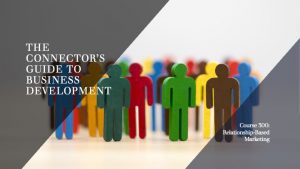How to Use a Reference Effectively
There are some prospects that are pre-disposed to doing business with you because they are current or former clients, because they are familiar with you or your brand, or because someone they trust has vouched for you. However, cross-sales, renewals, and sales to prospects that have been referred to you should not be taken for granted because your friend has a business agenda, same as you.
You may find yourself engrossed in a battle of competing mandates. You have a mandate to increase sales, but your prospect has a mandate to reduce costs. So, if you go into the meeting with a friendly prospect thinking that it’s a done deal, there’s a good chance that you’ll be in for an unpleasant surprise.
Don’t Be Presumptuous
A referral is merely a lead, and the referral source is just a lead generation tool. So, the referral isn’t a sale; it’s a sales appointment, at best, and a mere marketing opportunity, at worst. Similarly, renewals are schmooze sessions or sales appointments, not certain sales.
Sure, it is a good sign that the prospect has agreed to meet with you. But you don’t know which other providers the prospect also is meeting with. You don’t know if the matter you’ve come to discuss is a priority for the prospect. You don’t know what, if any, budget constraints exist this year that may not have existed last year. In short, you don’t know what the prospect’s situation is. Therefore, it is far too soon to ask for business, and this prospect is nowhere near ready to give you his order.
An Ineffective Reference
Let’s take a common scenario involving a large management consulting (MC) firm that advises Fortune 500 companies on M&A transactions. Let’s assume that a relative or close friend of the MC engagement partner is an estate planning attorney at an elite legal firm. The consultant invites the lawyer to a deal closing celebration where several of his clients’ C-Suite executives will be present.
At first glance, this may seem like a cross-selling opportunity to you, but it isn’t—not yet. You’re not on the agenda. You have been invited to a meet and greet. The expectation is that you will let the executives get to know you so that they will be comfortable discussing their estate planning goals with you at some point in the future. Therefore, your friend has set you up to market yourself, not to sign up clients. He has set you up to become a waiter—the type of provider who makes a pitch but doesn’t get a yes or no answer during the prospect’s current purchasing cycle.
Here’s how that outing likely will unfold. You’ll strike up conversations with several of the prospects and tell them all about your trust and estates work, your top-notch education, plus some hobby that you think you may have in common with them. They’ll nod and smile and promise to keep you in mind. You’ll stay in touch—maybe even connect on LinkedIn but you’re not likely to get any business any time soon, even though some of those people actually may need estate planning work.
An Effective Reference
Here’s an example of what the MC should have done to set you up for success. Assume an audit partner at an accounting firm takes a tax partner, not to a party but, to an end-of-engagement debriefing meeting with the CFO of a client he’s managing. During the meeting, the auditor sets his partner up for success by informing the CFO that his talented partner, who has a Master’s in Taxation, has taken a look at the company’s tax position and wants to bring some things to the CFO’s attention. This approach clearly readies the CFO for a sales consultation.
Salvaging a Poor Reference
Returning to the deal closing celebration with the C-Suite executives, you’re going into that event knowing that it is merely a marketing opportunity. So, have something to market—not your bio or resume. Instead, make it about them. When you’re engaged in small talk, consider inviting the executives to a 20-minute primer that you have prepared on loop holes created by the recently issued regulations, for example. Call it something like “3 Commonly Overlooked Estate Planning Opportunities.” Even if they already have estate planning counsel, they will attend your primer out of a fear of missing out. Then, you’ll have an opportunity to sell to or set sales appointments with them where you’ll learn who the incumbent provider is, how happy the prospect is with them, and what it will take for the prospect to consider working with you.











No responses yet